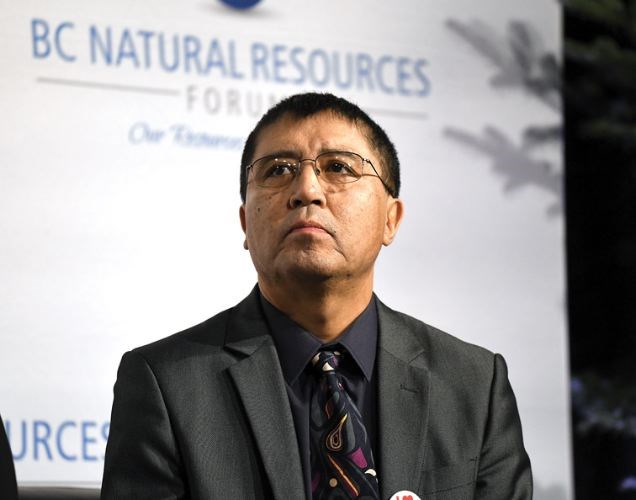A day after resource and municipal leaders crowded the stage of the B.C. Natural Resources Forum to express support for LNG projects in the north, members of first nations and conservationist researchers cast a more restrained note at a UNBC conference.
The Cumulative Impacts Research Consortium, a research organization that examines the comprehensive long-term effects of resource development, held a well-attended forum at UNBC on Friday. The forum examined issues such as watershed protection, wildfire preparation and human health impacts of resource development. At a panel examining indigenous land use, speakers stressed a need for changing the evaluation process for resource projects, with a more comprehensive focus on the impacts of these developments from past and future developments.
Terry Teegee, a regional chief of the B.C. Assembly of First Nations, attended the symposium. He noted that the AFN had a significant presence at the Natural Resources Forum. The forum, which brought together hundreds of energy, forestry and mining industry proponents with municipal, provincial and federal decision-makers, featured national chief of the Assembly of First Nations Perry Bellegarde as a keynote speaker.
However, Teegee suggested the enthusiasm for LNG projects might be at odds with the aims of establishing a new relationship with First Nations.
"Many of their pressures are coming from the market," Teegee said, of industry and government decision-makers.
"If commodities have high prices, they obviously want to develop it right away, whereas from this point of view, as part of indigenous governance, our pressures are to take care of the land, take care of our rights, our treaty rights, our title and interests. And that may not fit within the market realities of the world," Teegee said.
The discussion has particular relevance in light of the Truth and Reconciliation Commission. The Truth and Reconciliation Commission established the territorial claim of First Nations and stated that the burden of legal proof for infringing upon first nations title lay with outside parties, such as industry or government. The provincial NDP government has also stated its intention to implement the United Nations Declarations on the Rights of Indigenous Peoples.
Agnes Pawlowska-Mainville, an assistant professor of First Nations studies at UNBC said the notion of free, prior and informed consent of First Nations, which is recognized in the United Nations Declarations on the Rights of Indigenous Peoples, is widely viewed as allowing indigenous communities to halt resource projects if they are not adequately engaged.
"I think most First Nations would want a veto on what happens on their territory," Pawlowska-Mainville said.
The notion of free, prior and informed consent was a subject raised by many speakers at the B.C. Natural Resource Forum. Many industry leaders expressed support for this principle, as well as UNDRIP.
First Nation community leaders, such as Haisla Nation councillor Kevin Stewart, also spoke in support of LNG developments in the north. Stewart was among several municipal leaders who called the audience up on the stage in a flash mob-style show of support for LNG development.
As part of Friday's forum at UNBC, Clayton Davis, a member of the Treaty 8 Cumulative Effects Framework Working Group, spoke about the success of Treaty 8 First Nations in informing the Canadian Environmental Assessment Agency's evaluation of large industrial projects. Davis' group looked at a number of stressors in relation to the Murray River watershed. The work went beyond examining impacts upon traditional hunting, fishing and trapping in the area, and involved extensive consultation with affected communities.
"We have to go from resource-based decisions to value-based decisions," Davis said.
Teegee said First Nations people are not opposed to development. Still, speaking before the audience, he said land use planning in the region was often dealt with in an ad hoc manner.
"This is why it's so important that there needs to be a continued, comprehensive look at what's being developed. I think we really need a plan for this province, not only politically for four years," Teegee said.
"I think we really have to have a comprehensive look for this generation, next generation, perhaps the next 50-100 years."


